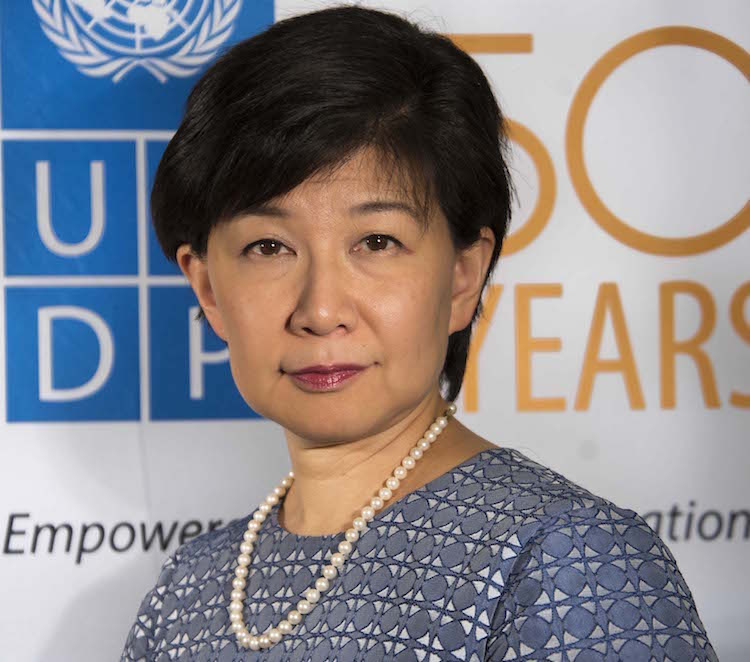By J Nastranis
NEW YORK (IDN) – Izumi Nakamitsu, whose appointment UN Secretary-General António Guterres announced on March 29 as the world body’s next disarmament chief is the second woman and third Japanese to be nominated for the post. A veteran UN official, she will succeed Kim Won-soo of the Republic of Korea as Under-Secretary-General and High Representative for Disarmament Affairs, Office for Disarmament Affairs (UNODA).
Kim Won-soo, whom Ban Ki-moon appointed in June 2015, took over as Angela Kane of Germany (2012-2015) vacated the chair. Her predecessors were: Brazil’s Sergio Duarte (2007-2012); Japan’s Nobuaki Tanaka (2006-2007), Japan’s Nobuyasu Abe (2003-2006), and Sri Lanka’s Jayantha Dhanapala (1998-2003).
UNODA, which Nakamitsu will be leading, was initially established as a department in 1982 upon the recommendation of the General Assembly’s second special session on disarmament (SSOD II). In 1992, it became the Centre for Disarmament Affairs, working under the Department of Political Affairs. At the end of 1997, it reverted to being the Department for Disarmament Affairs.
The Office promotes: nuclear disarmament and non-proliferation; strengthening of the disarmament regimes in respect to other weapons of mass destruction, and chemical and biological weapons; and disarmament efforts in the area of conventional weapons, especially landmines and small arms, which are the weapons of choice in contemporary conflicts.
Nakamitsu has been since 2014 Assistant Administrator for Crisis Response Unit of the United Nations Development Programme (UNDP). She has many years of service within and outside the UN system, most recently as Special Adviser Ad Interim on Follow up to the Summit on Addressing Large Movements of Refugees and Migrants (2016-2017) and in the UN Department of Peacekeeping Operations as Director, Asia and the Middle East Division (2012-2014) and Director, Division of Policy, Evaluation and Training (2008-2012).
Nakamitsu was, between 2005 and 2008, Professor of International Relations at Hitotsubashi University, Tokyo, also serving as member of the Foreign Exchange Council to the Japanese Foreign Minister, and as visiting senior advisor on peacebuilding at Japan International Cooperation Agency (JICA). She further served as Chef de Cabinet and Director of Planning and Coordination at the Stockholm-based intergovernmental organization, the International Institute for Democracy and Electoral Assistance-IDEA (1998-2004).
She held earlier in her career, number of positions in the UN system, both at Headquarters and in the field, including in the United Nations Reform Team of former Secretary-General Kofi Annan, and with the Office of the United Nations High Commissioner for Refugees (UNHCR), in the office of Assistant High Commissioner for Policy and Operations Sergio Vieira de Mello, and in UNHCR field operations in the former Yugoslavia, Turkey and northern Iraq.
UNODA provides substantive and organizational support for norm-setting in the area of disarmament through the work of the General Assembly and its First Committee, the Disarmament Commission, the Conference on Disarmament and other bodies. It fosters disarmament measures through dialogue, transparency and confidence-building on military matters, and encourages regional disarmament efforts; these include the United Nations Register of Conventional Arms and regional forums.
It also provides objective, impartial and up-to-date information on multilateral disarmament issues and activities to Member States, States parties to multilateral agreements, intergovernmental organizations and institutions, departments and agencies of the United Nations system, research and educational institutions, civil society, especially non-governmental organizations, the media and the general public.
UNODA supports the development and implementation of practical disarmament measures after a conflict, such as disarming and demobilizing former combatants and helping them to reintegrate in civil society.
Nakamitsu’s appointment comes two days after the United Nations Conference to negotiate a legally binding instrument to prohibit nuclear weapons, leading towards their total elimination kicked off on March 27, 2017. It concludes on March 31. The second session is scheduled for June 15 to July 7, 2017.
Japan is the only country in the world to have actually suffered the catastrophic consequences of nuclear war with over 210,000 people killed in the terror of the bombing of Hiroshima and Nagasaki.
Ambassador Nobushige Takamizawa, Japan’s Permanent Representative to the UN, who attended the opening session of the conference on March 27 said an international treaty “without the involvement of nuclear weapon states [would] only deepen the schism and division” in the international community.
“We will continue to pursue realistic and effective disarmament measures and will work to create a security environment conducive to the elimination of nuclear weapons,” he said.
While the majority of the world’s governments gathered in the room, President Donald Trump’s UN envoy, Nikki Haley, held a protest together with two of the five permanent (P5) veto-wielding members of the Security Council – the UK, France – and a number of Eastern European allies who feel threatened by Russia.
The other P5 Security Council members, Russia and China, did not join the protest group. But they are not participating in the talks first announced in October 2016 under the leadership of Austria, Brazil, Ireland, Mexico, South Africa and Sweden. Disarmament groups strongly support the effort.
Beatrice Fihn, the executive director of the International Campaign to Abolish Nuclear Weapons (ICAN) said the very unusual protest by Ambassador Haley and others “demonstrates how worried they are about the real impact of the nuclear ban treaty”. Finh, who heads an organization which is a strong supporter of the negotiations, said a treaty would “make it clear that the world has moved beyond these morally unacceptable weapons of the past”.
Rick Wayman, Director of Programs at Nuclear Age Peace Foundation (NAPF) commented early March 27: “In an epic role reversal, this morning we saw U.S. Ambassador Nikki Haley protesting outside the UN General Assembly Hall while the majority of the world’s nations, supported by NGOs from around the world, began negotiations on a treaty banning nuclear weapons.” [IDN-InDepthNews – 31 March 2017]
Photo: Izumi Nakamitsu. Credit: UNDP.
IDN is flagship agency of the International Press Syndicate

